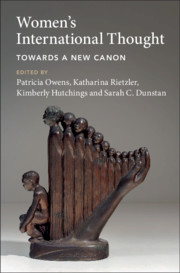Book contents
- Women’s International Thought: Towards a New Canon
- Women’s International Thought: Towards a New Canon
- Copyright page
- Contents
- Preface and Acknowledgments
- Introduction
- 1 Field and Discipline
- 2 Geopolitics and War
- 3 Imperialism
- 4 Anticolonialism
- 5 International Law and International Organization
- 6 Diplomacy and Foreign Policy
- From The Saar (1934)
- From “The War Aims of World War I and World War II and Their Relation to the Darker Peoples of the World” (1943)
- From The Rome–Berlin Axis (1949)
- From Foreign Policy without Fear (1953)
- From “India’s Foreign Policy Today” (1958)
- From “Decisionism” (1964)
- From The Debatable Alliance: An Essay in Anglo-American Relations (1964)
- From Germany 1789–1919: A Political History (1967)
- Margaret Lambert
- Merze Tate
- Elizabeth Wiskemann
- Vera Micheles Dean
- Adda B. Bozeman
- Judith Shklar
- Coral Bell
- Agatha Ramm
- 7 World Peace
- 8 World Economy
- 9 Men, Women, and Gender
- 10 Public Opinion and Education
- 11 Population, Nation, Immigration
- 12 Technology, Progress, and Environment
- 13 Religion and Ethics
- Index
Agatha Ramm
from 6 - Diplomacy and Foreign Policy
Published online by Cambridge University Press: 12 April 2022
- Women’s International Thought: Towards a New Canon
- Women’s International Thought: Towards a New Canon
- Copyright page
- Contents
- Preface and Acknowledgments
- Introduction
- 1 Field and Discipline
- 2 Geopolitics and War
- 3 Imperialism
- 4 Anticolonialism
- 5 International Law and International Organization
- 6 Diplomacy and Foreign Policy
- From The Saar (1934)
- From “The War Aims of World War I and World War II and Their Relation to the Darker Peoples of the World” (1943)
- From The Rome–Berlin Axis (1949)
- From Foreign Policy without Fear (1953)
- From “India’s Foreign Policy Today” (1958)
- From “Decisionism” (1964)
- From The Debatable Alliance: An Essay in Anglo-American Relations (1964)
- From Germany 1789–1919: A Political History (1967)
- Margaret Lambert
- Merze Tate
- Elizabeth Wiskemann
- Vera Micheles Dean
- Adda B. Bozeman
- Judith Shklar
- Coral Bell
- Agatha Ramm
- 7 World Peace
- 8 World Economy
- 9 Men, Women, and Gender
- 10 Public Opinion and Education
- 11 Population, Nation, Immigration
- 12 Technology, Progress, and Environment
- 13 Religion and Ethics
- Index
Summary
Even before the beginning of the new century a general European war, as an expected event, had been much in men’s minds. The novelist, Theodor Fontane, in 1896 foresaw a war between Germany and England ‘with such great certainty, that it does not matter if it happens now or in a year’s or in ten years’ time. Whose fault it will be’, he wrote, ‘is neither here nor there: it is a matter of historical necessity.’ An English naval officer summed up the mood of the years before 1914: ‘We prepared for war in our professional hours, we talked war, thought war, and hoped for war. For war would be our opportunity, and it was what we had been trained for.’ Universal military service in Germany made this kind of expectancy more widespread there than in England. Young men beginning careers in the public service fitted in a period of service as army officers and valued their association with the army then and subsequently through the reserve or militia, not least because of the high respect accorded in Germany to the army officer. Germany, as other countries, had her stories and novels prompted by popular Darwinism and notions of the survival of the fittest, written to the theme that ‘war with all its evils, calls out and puts to the proof some of the highest and best qualities of men’. In Germany their influence was heightened by the fashionable cult of the ‘great man’. The Emperor himself had avowed his adherence to the doctrine that God revealed Himself in great men and included William I – together with Hamurrabi, Moses, Shakespeare and Goethe – in a list of such men. The cult was stimulated by the harsh doctrine of Friedrich Nietzsche (1844–1900) that humanity must work unceasingly for the production of the solitary great man – ‘this and nothing else is its task’ – as well as by the liberal writings of the Swiss, Jakob Burkhardt, or even of Fontane.
- Type
- Chapter
- Information
- Women's International Thought: Towards a New Canon , pp. 356 - 358Publisher: Cambridge University PressPrint publication year: 2022



